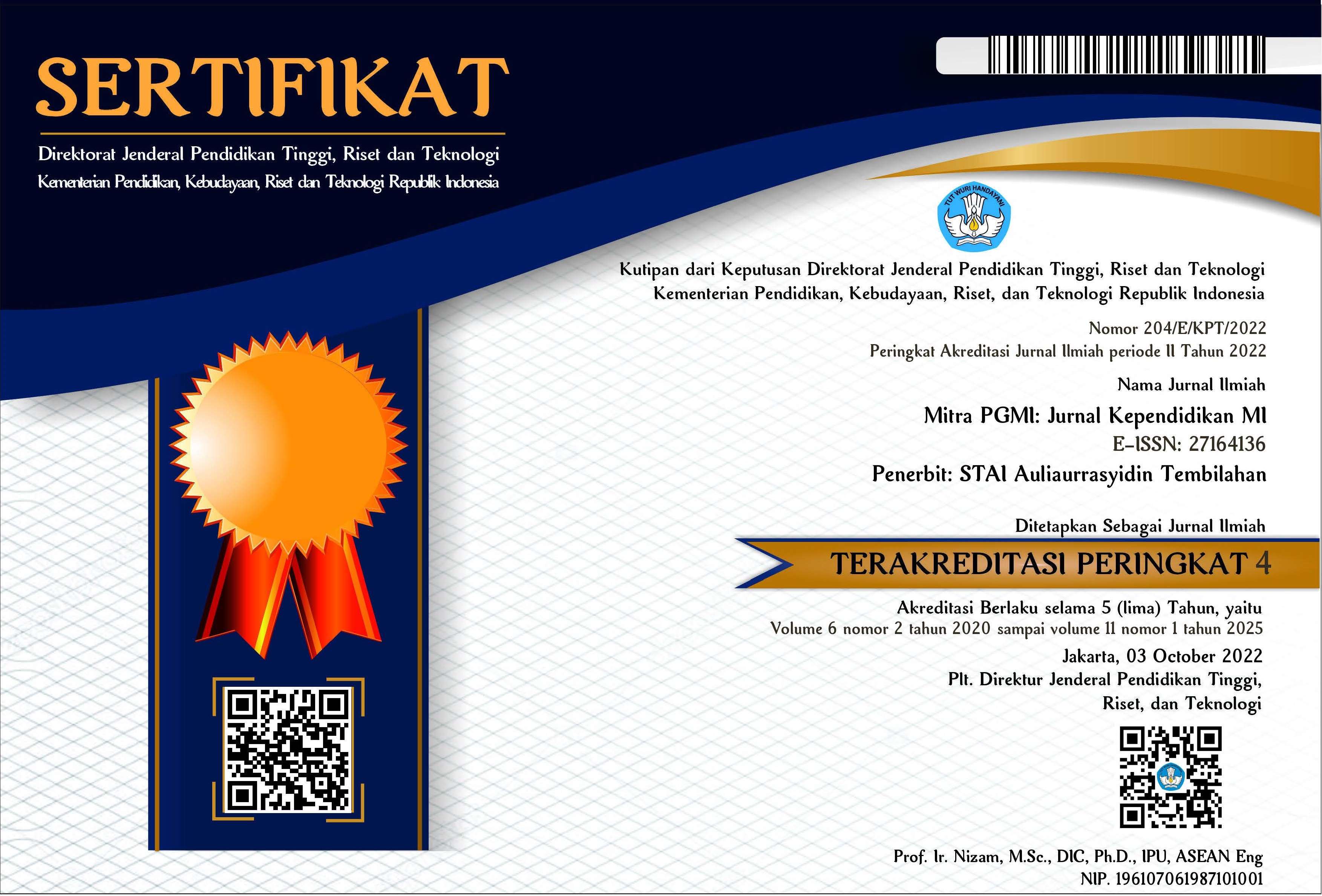Upaya Guru Pendidikan Agama Islam Mengembangkan Karakter Religius Peserta Didik SDIT Imam Asy-Syafii Pekanbaru
DOI:
https://doi.org/10.46963/mpgmi.v9i2.829Keywords:
Efforts of PAI Teachers, Character Education, Religious, Integrated Islamic Elementary SchoolsAbstract
This study aims to explore the professionalism of PAI teachers in developing the religious character of students. The research method used was qualitative with a case study approach, by interviewing seven research informants, namely the school principal and six PAI teachers. Data were analyzed using data reduction, data presentation, and conclusions and verification. The results showed that the efforts made by PAI teachers at SDIT Imam Asy-Syafii Pekanbaru in developing the religious character of students were done in a systematic way. Furthermore, in the teaching and learning process, learning materials are again inserted which emphasize the values of religious character in students. The supporting factor is that in the school environment there is a mosque that is quite large with complete facilities so that some student activities can be carried out in the mosque including sunnah dhuha prayers, noon and asr prayers, most of the students' guardians also understand the sunnah and one manhaj with the school so that the education received students at school are the same color as the education they receive at home. The inhibiting factor is that there are still guardians of students who are not yet semanhaj and the pattern of education at home and at school for children is different. The findings in this study have implications for the professional theory of Islamic religious education teachers in building students' religious character.
Downloads
References
Ahsanulkhaq. (2019). Membentuk Karakter Religius Peserta Didik Melalui Metode Pembiasaan. Jurnal Prakarya Paedagogia.
Asmani, & Ma'mur, J. (2011). Buku Panduan Pendidikan Karakter di Sekolah . Yogyakarta: Diva Press.
Daryanto. (2013). Standar Kompetensi dan Penilaian Kinerja Guru Profesional. Yogyakarta: Gava Media.
Desi, S., & Tambak, S. (2020). Developing Indonesia Language Learning Assesments Strengthening the Personal Competence and Islamic Psychososial of Teaccher. Journal of Educational and Research in Education, 1079-1087.
Ekoswoyo, R., Joko, T., & Suminar, T. (2019). Potensi Keluarga dalam Pendidikan Holistik Berbasis Karakter pada Anak Usia Dini. Jurnal Edukasi.
Hardani. (2020). Metode Penelitian Kualitatif dan Kuantitatif. Yogyakarta: Pustaka Ilmu.
Jannah. (2019). Metode dan Strategi Pembentukan Karakter Religius yang diterapkan di SD IT An Najah Pondok Pesantren Cindai Alas Martapura. Jurnal Pendidikan Madrasah Ibtidaiyah.
Kemendiknas. (2010). Pengembangan Pendidikan Budaya dan Karakter. Jakarta: Kemendiknas RI.
Komalasari, K., & Saripudin, D. (2017). Pendidikan Karakter Konsep dan Aplikasi Living Values Education. Bandung: Refika Aditama.
Komara, E. (2018). Penguatan Pendidikan Karakter dan Pembelajaran Abad 21. South East Asian Journal.
Mathew, M., & Huberman, M. (1994). An Expandedd Soucebook Qualitative Data Analysis. London: Sage Publications.
Moleong, L. J. (2017). Metodologi Penelitian Kualitatif. Jakarta: Remaja Rosda Karya.
Muchith. (2016). Guru PAI yang Profesional. Jurnal Quality, 224-225.
Muhyani. (2019). Metodologi Penelitian : Cara Mudah Melakukan Penelitian. Bogor: Uika Press.
Nawawi, I. (2021). Adab diatas Ilmu Tuntunan Belajar Mengajar yang Barokah , Adabul Alim Wal Mutaqallim. Yogyakarta: Diva Press.
soemarno, S. (2009). Karakter Mengantar Bangsa dan Gelap Menuju Terang. Jakarta: Media Kompas Gramedia.
Sugiyono. (2013). Metode Penelitian Pendidikan Pendekatan, Kuantitatif, Kualitatif dan R & D. Bandung: Rosda Karya.
Suryosubroto. (1997). Proses Belajar mengajar di Sekolah. Jakarta: Rineka Cipta.
Usman, M. U. (2008). Menjadi Guru Profesional. Bandung: Rosdakarya.
Wismanto. (2021). Pembentukan Awal Generasi Mukmin dalam Al-qur'an Hadits dan Implikasinya pada Siswa di Sekolah Dasar Islam Terpadu Imam Asy-syafii. Jurnal Magistra.
Downloads
Published
Issue
Section
License
Copyright (c) 2023 Nurhaibi Nurhaibi, Zalisman Zalisman, Haryuni Hariati

This work is licensed under a Creative Commons Attribution-ShareAlike 4.0 International License.
Authors who publish with this journal agree to the following terms:
1. Copyright on any article is retained by the author(s).
2. The author grants the journal, right of first publication with the work simultaneously licensed under a Creative Commons Attribution shareAlike 4.0 International License that allows others to share the work with an acknowledgment of the work’s authorship and initial publication in this journal.
3. Authors are able to enter into separate, additional contractual arrangements for the non-exclusive distribution of the journal’s published version of the work (e.g., post it to an institutional repository or publish it in a book), with an acknowledgment of its initial publication in this journal.
4. Authors are permitted and encouraged to post their work online (e.g., in institutional repositories or on their website) prior to and during the submission process, as it can lead to productive exchanges, as well as earlier and greater citation of published work.
5. The article and any associated published material is distributed under the Creative Commons Attribution-ShareAlike 4.0 International License








2.png)


